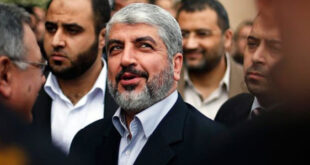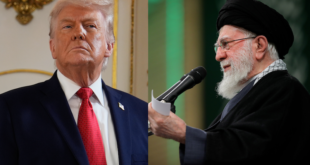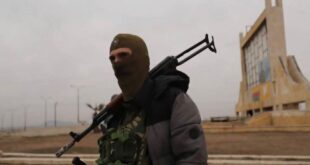
Russian Defense Ministry releases statement categorically rejecting claim its troops are participating in Idlib offensive.
Russia has reportedly dispatched special forces to the front line of an ongoing Syrian regime offensive in the northwestern province of Idlib, the last major bastion controlled by rebels, mainly from Hayat Tahrir al-Sham, an al-Qaida-linked group.
In response, the Russian Defense Ministry on Thursday released a statement categorically denying the claim. If true, however, it would mark the first time that Moscow has deployed ground troops to partake in the three-month-long assault, which has killed hundreds, if not thousands, of people and displaced an estimated 300,000, thereby raising fears of another humanitarian crisis.
The offensive has also angered Turkey, which maintains a strong military presence on the Syrian side of a shared border through its National Liberation Front proxy. Turkey occupies numerous strongholds in northern Syria, where it sent its troops as a bulwark against Syrian-Kurds combatting President Bashar al-Assad’s loyalists. Ankara sees those fighters as allies of the Kurdish Workers Party, or PKK, which has been waging an insurgency within Turkey in an effort to secure autonomy.
Accordingly, analysts believe there is a risk of a direct clash between the parties foremost involved in the conflict, which could lead to its spiraling out of control again, further dampening the prospect of a peace agreement (read “détente”) to end eight-plus years of carnage.
Eugene Sensenig, a political science professor at Notre Dame University in Lebanon, told The Media Line that the ongoing offensive in Idlib is largely a result of anti-regime, internally displaced Syrians having been transferred to the province after Damascus regained control of other major areas formerly held by rebels.
“Most of the forces that opposed Assad have lost ground, and a lot of their civilian population has fled to this region,” Sensenig said.
“I’m not going to blame the Russians alone. They have interests in the region… [and] they’re the only players who seem to have a strategy. The ‘bad guys,'” he continued, “are the ones who have caused the problem by doing nothing – namely, the United States and European Union.”
Sensenig likewise warned of a potential humanitarian catastrophe and another mass wave of refugees.
“[The fighting in Idlib] will force people out,” he said. “They can go in two directions: One would be somewhere else in Syria, which is very unlikely because there is nowhere else to go, and the other is crossing the borders into neighboring countries.”
Sensenig believes that those fleeing will most likely attempt to cross into Turkey, which is already home to some 3.5 million Syrian refugees.
“The European Union,” he added, “is going to want to keep the new refugees in Turkey, which is something Ankara [will not countenance]. This is going to lead to a huge escalation on the refugee front between the Russians, the EU and Turkey.”
Meanwhile, Russia has conducted some 200 bombing missions during the Idlib campaign, with Syrian soldiers unable to make any major advances. In one such bombardment, Russian jets killed 544 civilians and wounded 2,000 others, according to the Syrian Observatory for Human Rights. The organization claims that illegal weapons were used during the attack, including cluster bombs, incendiary explosives and air-dropped munitions that are deadly over a broad area.
Not surprisingly, then, Moscow earlier this year blocked the United Nations Security Council from issuing a statement on the increased fighting in Syria’s northwest, according to an unnamed diplomat cited by the Associated Press. Members reportedly proposed that the Council condemn the violence, as well as call for humanitarian access, safe return for refugees and adherence to international law on protecting civilians.
For his part, UN Secretary-General Antonio Guterres expressed deep concern “about the escalation of the fighting in Idlib,” adding that “the situation is especially dangerous given the involvement of an increased number of actors.”
The US State Department has also warned that “indiscriminate attacks on civilians and public infrastructure such as schools, markets and hospitals… [are] unacceptable.” Despite the harsh rhetoric, many believe that Washington has little influence over events in Syria due to a limited American military presence that President Donald Trump wants to reduce even further.
Nevertheless, Dr. Zvi Magen, a former Israeli ambassador to Russia and currently a senior research fellow at the Tel Aviv-based Institute for National Security Studies, does not foresee the fighting in Idlib spilling over into the rest of the Middle East.
“It will not impact the region,” he told The Media Line. “Russia’s whole military presence in Syria is very limited. The main idea is that [Russian troops] are supposed to help the regime by fighting rebels.”
Dr. Bassam Abu Abdallah is a Syrian-based political analyst and a former professor of international relations at Damascus University, who currently teaches at numerous local schools. He told The Media Line that “in Idlib, we are facing terrorists. They are not democratic people; they are not innocent.… We are talking here about foreigners from different nationalities that are fighting on behalf of al-Qaida and other extremist organizations.”
Even if the report of deeper Russian involvement in Idlib is correct, Abu Abdallah does not believe the development marks a change in Russia’s overall strategy.
“It’s [the result] of supporting the Syrian state…and not [a shift in] the Russian position generally, which is that Idlib should be [rid] of these terrorists.”
He also suggested that the confrontation is part of a broader geopolitical war.
“The US wants to close the [land bridge] between Damascus, Baghdad and Tehran. It also does not want Russia to have a position on the eastern part of the Mediterranean Sea. Then there is Turkey, which both Washington and Moscow want on its side,” he said.
“The confrontation is complicated,” Abu Abdallah concluded. “It’s not only a civil war, it’s an international battle taking place on Syrian ground.”
 Eurasia Press & News
Eurasia Press & News


